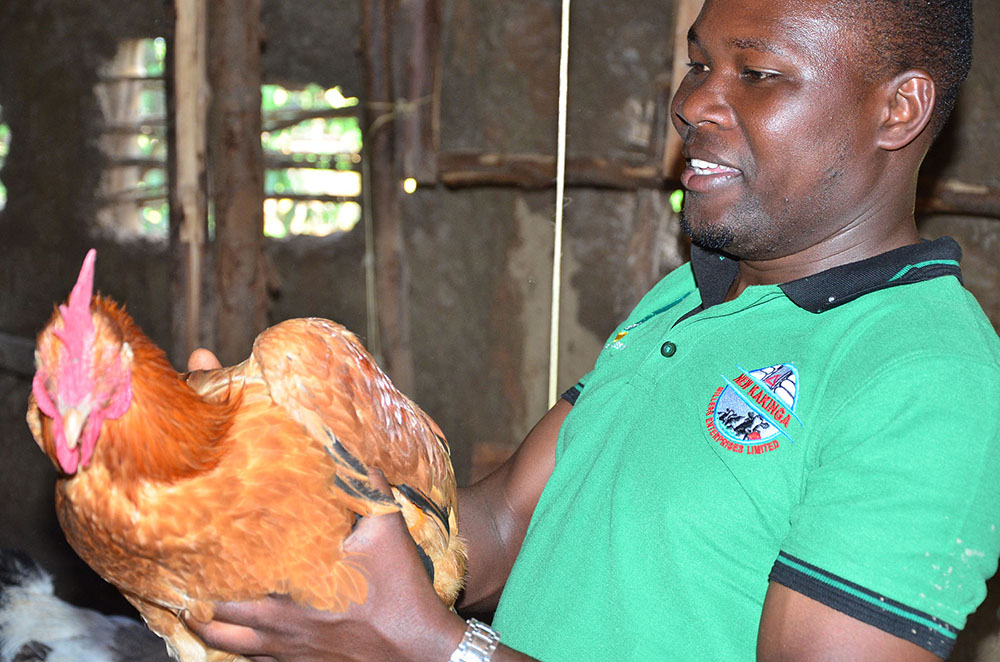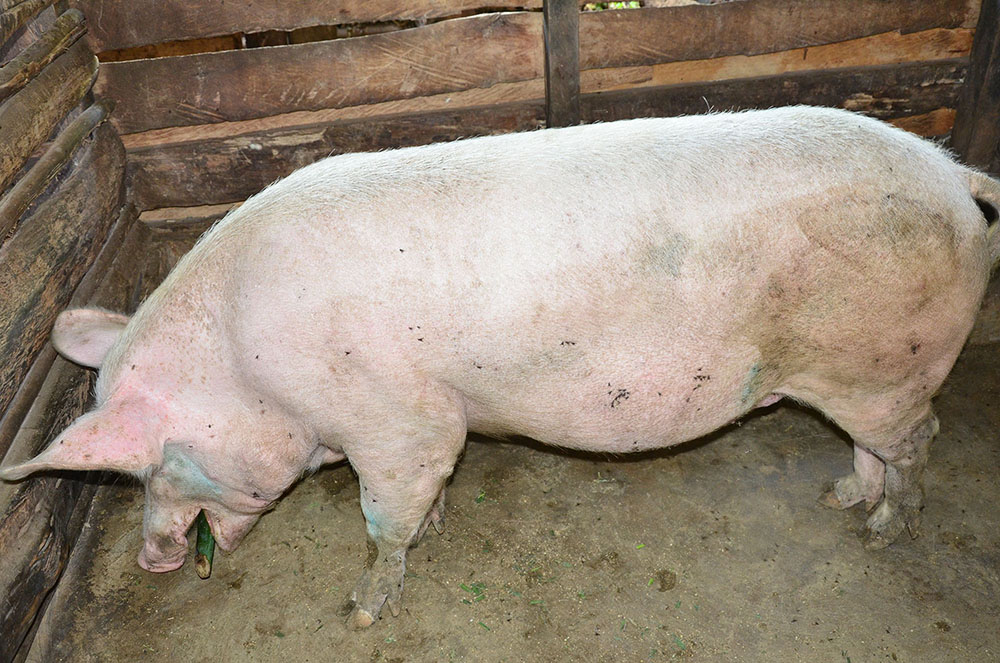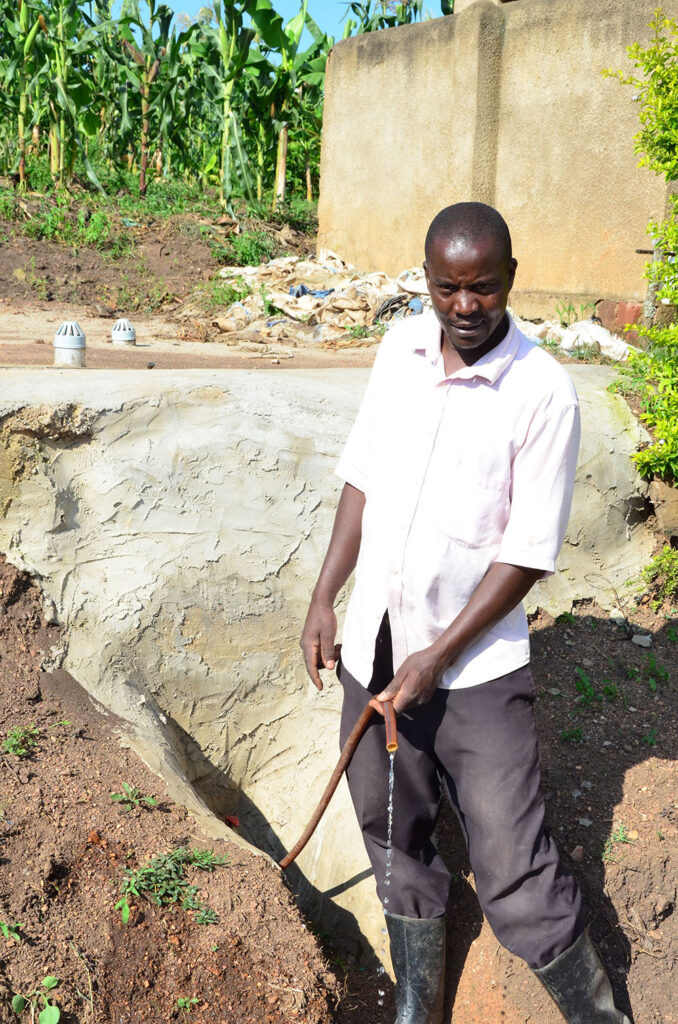Richard Kansiime is enthusiastic on issues about farming and progressive agriculture. It is no surprise that the soft-spoken 45-year-old agripreneur is a household name in Igorora town council and Ibanda district.
He operates three main agri-enterprises – poultry, piggery and dairy farming, which earn him about sh80m per annum.
When Kansiime decided to diversify into poultry, he wanted to maximise on benefits that accrue from enterprise mix. With sh1.2m he bought 300 layer chicks at sh4,000 each. During the second phase, he increased the number bought 1,000 layer chicks.
Later, he added another 1,000 chicks of the kuroiler breed to “tap into both the meat and egg markets”, he explains. Presently, he rears only the kuroilers.
“I usually sell off the cocks from three months old upwards. They have demand because their meat as like that of local birds. Even the eggs are sold at premium rates like those of the local chicken because their yellow yolk as they are fed on greens, he explains. The eggs range from sh10,000 to sh11,0000 each tray,” he says.
Kansiime has 3,700 birds, including 1,452 kuroilers (cocks and hens) and 1,270 layers, giving him about 900 eggs daily.
He sells the off-layers at between sh20,000 and 30,000 each, depending on size while the cocks go sh40,000 on average. The birds are sold to hotel operators and mchomo vendors in Ibanda town and Igorora trading centre while some are taken by people with parties, like weddings and thanksgiving.
The farmer has taken advantage of new media and markets their products and services on social media platforms, Twitter, WhatsApp and Facebook.
Why poultry
Kansiime says he was attracted to bird rearing because it does not need a lot of land; one can also get return on investment easily and quickly. It also boosts family nutrition and hence helps me save on money for eggs and meat. He started with storeyed temporary wooden structure for the birds that cost him sh40m to build. Recently, he completed a three-room permanent house for the birds at cost of sh32m. The bricks used to build it were made by the family members, which helped to reduce cost.

Good practices for poultry
Ø Ensure the chicks are fully immunized to guard against diseases like New Castle and bomboro.
Ø Feed the birds well and always provide enough water.
Ø Ensure cleanliness and hygiene
Ø Good housing is also essential. The houses should be well positioned for better aeration.
Ø Consult vets
Ø Always isolate the sick birds to limit infections.
Piggery project
Kansiime started rearing pigs in 2000 with two piglets bought at a total of sh100,000. At the time, he had no pigsty and a tree provided shelter to the animals. However, he later built a four-stance temporary structure at sh250,000. He has since expanded to 20 units, holding 100 pigs and piglets, including 20 sows, one boar and 72 piglets, among others. He rears the large white and camborough pig breeds. Kansiime explains, “These are good breeds for farmers as the sows give a large litter of above 10 piglets each time they produce. They also have demand among farmers and pork dealers.”
The multi-enterprise farmer sells a one-month-old piglet at sh100,000 while sows range from sh650,000 to sh1.5m (for 200kg) each, depending on size and breed. He earns about sh5m from the piggery unit every five months from selling piglets.
Interdependence
The projects have a sort of symbiotic relationship and support each other in many ways. For instance, the manure and urine from the pigs is used in pastures and vegetables that feed the cows and birds, respectively. That from the birds is ‘processed’ and fed to the pigs. Also, when one of the projects is not bringing in good cash, the money from the others units keep it running smoothly, says Stella Kyomuhangi,Kansiime’s wife, who is the operations manager of sorts.
Do it right
Kyomuhangi says openness and trust between couples especially on money matters and embracing the saving culture were crucial for such ventures to be sustainable. She urges women to support their husbands and get involved in the running of the enterprise
Kyomuhangi supervises the workers and also caters their welfare to “ensure they are more productive”.
She advises employers to always guide the workers and provide for them, if possible, saying this boost their morale and productivity. “Some workers will neglect their duties when they are not supervised. This can be costly in case of disease outbreak or poor feeding.”
To ensure efficiency, each of the three projects – poultry, piggery and dairy – is manned by one permanent worker. Permanent staff on the farm earn sh100,000 per month each and have other incentives like free food and accommodation.
Gains
Kansiime has over 72 acres of land. Piggery and poultry units occupy an acre of land each while 60 acres of land have been dedicated to the dairy project, the rest is under banana and coffee production and family home. Part of this land (12 acres) was inherited from his father. He bought 50 acres over the years using savings from the farming projects.
Kyomuhangi says the enterprises have enable them to cater for the family’s essential and other needs and pay school fees for their children with ease. We have also bought five plots and built one commercial building in Igororo town, adds Kyomuhangi.
Business sustainability plan
Sharon Natukunda, Kansiime’s daughter, has used the time schools are closed to get immersed in the running of the farm. “I take care of the animals in case workers are not around, including treating them. I also manage the business “since I have learnt from my father how things work”.
His Duncan Matsikois considered the ‘resident expert’ for the poultry project. He also oversees the birds’ feeding, watering and general welfare. He says the birds are given feeds, mainly mash or maize bran commonly known as ‘broken’ twice a day, at 6am and at 2pm. There must always be water in the drinkers, adds Matsiko who will be joining university soon. I ensure that the sick birds are isolated and treated, he adds.
Bio-safety and security
a) There is footbath at entrances to the bird houses and the pigsty to stop spread of diseases that could be carried in footwear.
b) The farmer also has two bulldogs that help to keep away intruders on the farm.
c) He has also uses solar-powered floodlights at night to strengthen his security at night.
d) The farm is also accessible from one entrance, which restricts trespassers.
Mistakes and lessons learnt
Kansiime says that when he started the poultry unit, he delayed to immunize the chicks leaving to scores dead.
Poor treatment regime for the cows was one of the mistakes made in dairy production unit.
“I learnt the hard way that full immunization and hygiene were important for birds. Now I consult vets in case the animals and birds are sick.”

Community support
Apollo Agaba, assistant veterinary officer Igorora twon council, says Kansiime provides a steady market for napier grass from the community to make silage for the cows. They also sell him fodder crops. The workers at the farm are also from the community. The residents get quality breeds for cattle and pigs from within their community, thanks to Kansiime.
“I have learnt a lot from him given his hands-on approach to doing work.”
Water harvesting
Water is a treasured resource at Kansiime’s farm. To ensure reliable and uninterrupted water supply for the pigs, chickens and cows, the farmer has so far built six underground water reservoirs to harvest rain water, holding a total of over 300,000 litres of water between them. “He never runs out of water for enterprises. This (rain water harvesting) should be promoted among residents for sustainable commercial agriculture production,” says Igorora town council extension staff Agaba.
Value addition
The agripreneur has a machine to make chicken feeds, especially maize bran (commonly referred to as broken). He also has a silage making machine. Both of these plants are powered by a generator. This has enabled me to cut operational costs and ensure quality, he says.
Covid-19 impact
I used to collect 60 trays of eggs but they were no buyers, he says. I was forced to sell the eggs at sh4,000 per tray. The buyers were even reluctant to pay this amount, he said. So, I eventually sold off the layers to cut loses. I am planning to add value to some of the livestock products like milk to make ghee or yoghurt to guard against such challenges.
Looking ahead
Kansiime is planning to expand the poultry project to around 5,000 birds to take advantage of the growing market for the kuroiler eggs.
He also plans to make the dairy section fully zero-grazing. He argues that cows under the zero grazing produce more milk, if they are well fed.
He is seeking to acquire a micro-irrigation equipment to support his ventures, especially growing of fodder and chicken feeds.
The family plans to develop more agro-tourism products besides farmer trainings.






